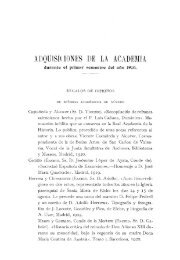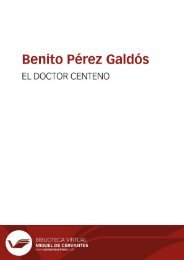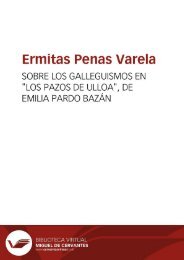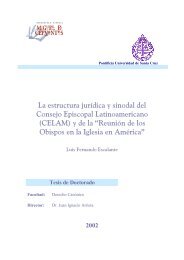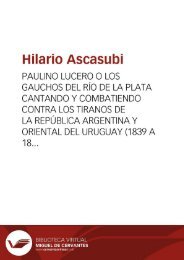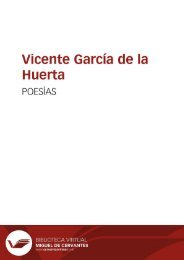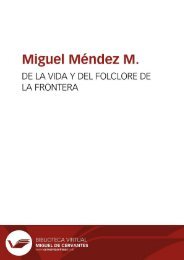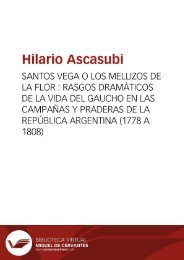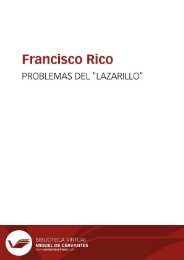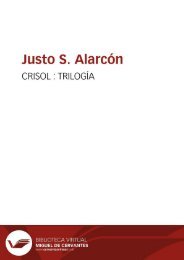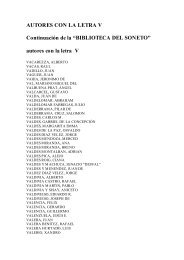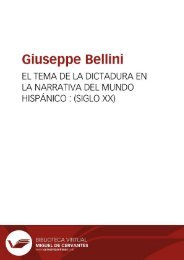You also want an ePaper? Increase the reach of your titles
YUMPU automatically turns print PDFs into web optimized ePapers that Google loves.
Anales galdosianos [Publicaciones periódicas]. Año XII, 1977<br />
with what appears at times to be diabolical cleverness, Don Lope plays with Tristana's emotions,<br />
alternately giving her more freedom and pulling her back toward him; at times being understanding,<br />
affectionate, and paternal; at other times, becoming insanely jealous and tyrannical. Tristana is left<br />
emotionally unsure of herself, and her feelings toward Don Lope become increasingly ambivalent.<br />
Yet, in the course of the novel, Don Lope becomes less monstrous, more human, and indeed shows<br />
some genuine affection for Tristana. The fact is that he does nothing actively to prevent Tristana<br />
from becoming free, from realizing her self. Indeed, he encourages all her efforts at self-expression.<br />
He becomes increasingly tolerant of Tristana's relationship with Horacio, offers to write the letters<br />
to Horacio which Tristana dictates to him, and in the end even allows Tristana to see his rival. Don<br />
Lope, sure of his ultimate victory, is content to play a waiting game. The worldly-wise old rake<br />
understands very well Tristana's idealistic temperament, Horacio's mediocrity, and the real nature of<br />
the relationship between them, which he knows is bound to end unsatisfactorily.<br />
At the same time, the reader cannot help but feel that Tristana's illness, the cancer which results<br />
in the amputation of her right leg, is equally responsible for her failure. If Don Lope's seduction of<br />
Tristana first placed limits on her freedom, it is the incapacitating illness which seals her fate, leaving<br />
her a complete invalid, totally dependent on others. Her illness further limits her possibilities to act,<br />
and the operation which follows leaves her a «mutilated woman», even less desirable to men.<br />
Yet, although these two factors set up the external limits of Tristana's freedom, they do not<br />
completely explain the internal dynamics of her psychological development. As we have already seen,<br />
Don Lope's seduction of Tristana may have reduced her freedom in society, but it was at the same time<br />
the occasion of her awakening to consciousness and the impetus toward self-realization. Tristana's<br />
illness is, in fact, only the ultimate manifestation of her innate incapacity to act in the real world.<br />
Tristana herself intuitively associates her illness with Don Lope. As she writes to Horacio for the<br />
first time of the pain in her leg, she explains: « Es que don Lope me ha pegado su reuma. Hombre, no<br />
te asustes; don Lope no puede pegarme nada, porque... ya sabes... No hay caso. Pero se dan contagios<br />
intencionales. Quiero decir que mi tirano se ha vengado de mis desdenes comunicándome por arte<br />
gitanesco o de mal de ojos la endiablada enfermedad que padece. » (p. 1585) We may ask, what<br />
justification is there for this intuitive understanding that Don Lope is somehow « responsable »<br />
for her illness?<br />
The fact is that Tristana's illness, and the subsequent amputation of her diseased limb which leaves<br />
her an invalid, incapable of acting on her own, accomplish precisely what Don Lope has always<br />
133





